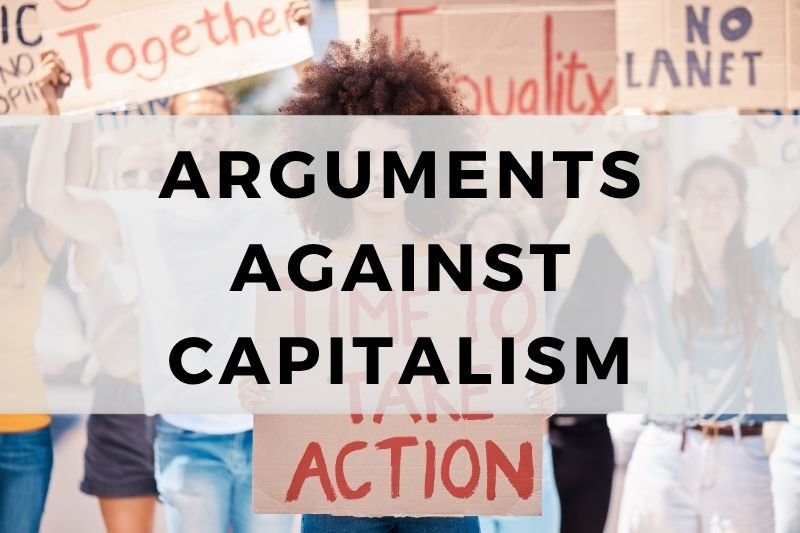
Capitalism has long been heralded as the engine of innovation, progress, and individual freedom. Yet, beneath its promises of prosperity lies a system that many argue is deeply flawed. From rising inequality to environmental degradation, critics point to a range of issues that challenge capitalism’s moral and practical foundations. As global crises intensify and public discourse evolves, these critiques are gaining renewed attention. This article explores key arguments against capitalism that confront the dominant economic narrative and raise important questions about the sustainability and fairness of the system we often take for granted.
Key Arguments Against Capitalism
#1. Economic Inequality
Capitalism concentrates wealth in the hands of a few. While markets promise equal opportunity, outcomes often favor those who already hold capital. The top 1% owns more wealth than the entire bottom half of the population in many countries. This gap isn’t just about income—it includes access to education, healthcare, housing, and political influence. Workers may see stagnant wages while CEOs receive multi-million dollar bonuses. Inheritance further entrenches these disparities, creating generational inequality. Capitalist systems tend to reward profit over fairness, leading to structural poverty. Even in wealthy nations, millions live paycheck to paycheck. This growing divide undermines social cohesion and political stability, and it challenges the notion that capitalism naturally benefits everyone through a “trickle-down” effect.
#2. Exploitation of Labor
Capitalism relies on profit maximization, which often comes at the expense of workers. Employers seek to reduce labor costs through low wages, minimal benefits, and poor working conditions. This is especially evident in the global supply chain, where corporations exploit cheap labor in developing countries. Workers may labor long hours for subsistence pay while the value they create flows upward. The imbalance of power between employers and employees favors capital owners, not laborers. Union suppression, gig economy instability, and job outsourcing are modern symptoms of this dynamic. Even in wealthier nations, job insecurity and wage stagnation persist. The system treats labor as a cost to be minimized rather than a human contribution to be valued.
#3. Environmental Destruction
Capitalism encourages endless growth, which is incompatible with a finite planet. Companies prioritize short-term profits over long-term sustainability. Natural resources are extracted aggressively, ecosystems are damaged, and pollution is often an externalized cost. The fossil fuel industry, deforestation, and industrial agriculture all thrive under capitalist incentives. Regulatory systems are often weakened by corporate lobbying, making it difficult to hold polluters accountable. Greenwashing allows companies to appear eco-friendly while continuing harmful practices. Climate change, biodiversity loss, and water scarcity are not market “failures”—they’re predictable outcomes of profit-driven decision-making. Without systemic changes, capitalist economies will continue to drive environmental degradation under the guise of progress.
#4. Commodification of Basic Needs
Capitalism turns essential human needs into products for sale. Healthcare, education, housing, and even clean water become profit centers. Access depends on ability to pay, not need. In privatized systems, those with money receive high-quality services, while others are left behind. Pharmaceutical companies price life-saving drugs far beyond what many can afford. Education becomes a privilege, not a right, leading to generational disadvantages. Housing markets prioritize speculation over shelter, fueling homelessness and rent crises. When corporations control basic needs, they serve shareholders, not the public good. The profit motive distorts priorities and undermines the principle that certain resources should be universally accessible and protected.
#5. Market Failures and Crises
Capitalist markets are not inherently stable or self-correcting. Financial crises, recessions, and asset bubbles are recurring features of capitalist economies. The 2008 financial crash exposed the systemic risk of deregulated markets and speculative finance. Millions lost homes, jobs, and savings while banks were bailed out. These failures are not anomalies—they’re built into the system’s cyclical nature. Markets often misprice risk, ignore long-term consequences, and react irrationally to short-term stimuli. Public services get slashed during downturns, compounding social harm. Governments must constantly intervene to stabilize the system, contradicting the claim that capitalism functions best with minimal interference. These recurring breakdowns erode public trust and expose capitalism’s vulnerability.
#6. Moral and Cultural Critiques
Capitalism promotes consumerism, materialism, and individualism at the expense of deeper values. It equates worth with wealth and success with consumption. This undermines community, empathy, and civic responsibility. People become consumers first and citizens second. Art, culture, and relationships are commodified and evaluated by market value. Ethical decisions are sidelined if they threaten profit margins. Capitalism often rewards greed and punishes cooperation. In such a system, compassion and solidarity are liabilities, not strengths. Cultural institutions, including media and education, are shaped by corporate interests, distorting public discourse. These moral distortions weaken democracy and foster a shallow, transactional view of life that leaves many feeling alienated and unfulfilled.
#7. Global Inequities
Capitalism fuels global imbalances between wealthy and poor nations. Colonial legacies evolved into economic systems where the Global South supplies cheap labor and resources to the Global North. International trade agreements and institutions like the IMF often impose policies that benefit multinational corporations while restricting local development. Developing nations carry heavy debt burdens and face structural adjustment programs that cut essential services. Wealth flows out of poor countries through exploitative supply chains, tax avoidance, and intellectual property laws. Capitalism reinforces a global hierarchy where economic power remains concentrated. This undermines sovereignty, worsens poverty, and limits true self-determination for billions of people around the world.
Closing Thoughts
The arguments against capitalism outlined above reveal deep systemic issues that affect individuals, communities, and the planet. While capitalism has driven technological progress and lifted some out of poverty, its structural flaws raise serious ethical, social, and environmental concerns. Critics argue that without fundamental reform or replacement, capitalism will continue to generate inequality, exploitation, and ecological destruction. These critiques invite us to reconsider our assumptions about economic systems and imagine alternatives rooted in equity, sustainability, and shared prosperity. The debate is not just academic—it shapes the future we build for the next generation.
